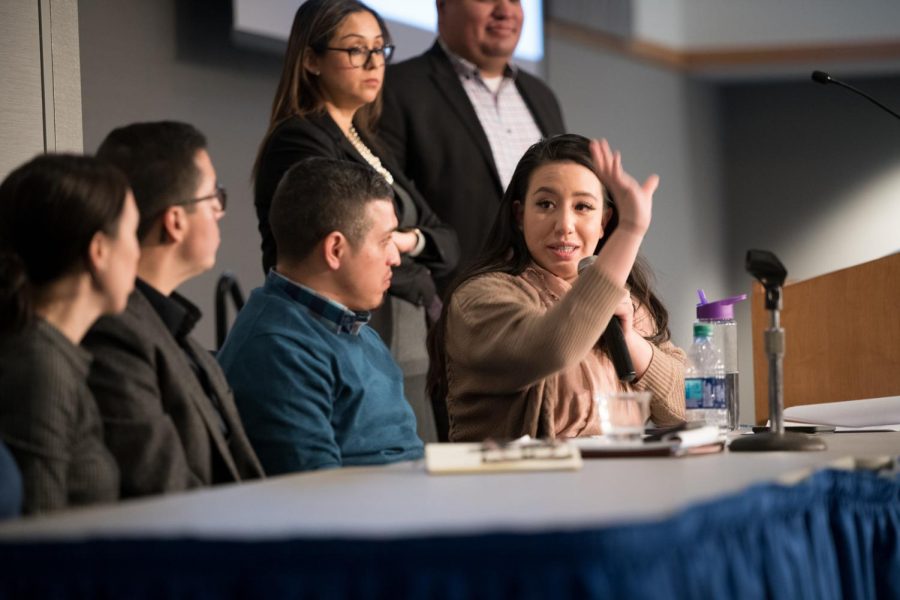NEIU student humanizes her story at ‘DACAmentation’ town hall
NEIU student Melanny Buitron speaks to fellow panelists about her journey being a DACAmented student.
December 2, 2018
NEIU is one of the 10 institutions nationally to receive a $35,000 microgrant from the Online News Association’s Challenge Fund for Innovation in Journalism Education. With that money, NEIU students, faculty and alumni will produce six podcasts in association with Spanish Public Radio (SPR) to create “DACAmentation: Humanizing Our Stories.”
The first town hall meeting offered a public, open space for five panelists to talk about the current immigration upheaval to Deferred Action for Childhood Arrivals (DACA) program on Nov. 20. The meeting was live-streamed on SPR.
NEIU student Melanny Buitron was one of the panelists. Buitron migrated to the U.S. at the age of one. Buitron said that positive reinforcement for undocumented students allows them to “come out” and tell people about their situation.
“I do not tell my story for you to feel pity for me,” Buitron said during the town hall meeting. “I do not want to hear the words, ‘Oh, I am sorry for you.’ Hearing, ‘I am here for you’ or ‘I am here to support you’ are words you can say to those who are undocumented so they can know that you are there for them.”
Buitron stressed the importance of U.S. citizens voting. According to the Center for Immigration Studies, 44.5 million immigrants in the U.S. are not eligible to vote.
“If you are eligible to vote, keep undocumented people in mind, regarding voting off people in office with specific agendas,” Buitron said. “You are our voice when you vote.”
Buitron also spoke on the lack of acknowledgment of mental health services for undocumented students.
“I always feel alone or personally attacked; I especially felt that way in the beginning of 2016 when President Trump was elected,” Buitron said to the Independent before the meeting. “(My therapist) always told me,‘You are one in 800,000’, and I think telling my story humanizes those numbers.”
The other four panelists were Tanya Cabrera, associate director for equity and inclusion at the University of Illinois at Chicago; Maureen Fitzpatrick, associate vice chancellor of adult education at City Colleges of Chicago; Dr. Miguel Angel Saucedo, director of strategic partnerships and special populations for Chicago Public Schools; and Joseph Saucedo, assistant director of student diversity and multicultural affairs at Loyola University Chicago.
Dr. Saucedo said that within the 25 participants who were awarded the Illinois Dream Fund Scholarship, over 90 percent of them were working part-time jobs. He asked the panelists what they were doing to provide additional resources for access to funding.
“There’s not much work done around mental health services,” Dr. Saucedo said. “We know that there is a ton of anxiety, issues and depression among (undocumented students). I borrow many quotes from Sandra Cisneros like, ‘The single act of survival is the act of hope.’ Even if one of my students finds out in his senior year that he is (undocumented), it doesn’t mean he is hopeless; It just means he has received a reality check in the sense of, ‘here are my limitations now.’(Undocumented students) are surviving. They are out there struggling.”
Joseph Saucedo spoke on the Magis Scholarship Fund: a scholarship created for undocumented students by the Student Government of Loyola Chicago (SGLC) and the Latin American Student Organization (LASO) at Loyola.
Students in both organizations collaborated to allocate funds by fundraising and by adding an additional fee of $2.50 every semester to the Loyola`s Student Development fee. SGLC and LASO raised $100,000 in 2015 and received an additional $50,000 from Don Graham, chairman and CEO of Graham Holdings Company and founder of TheDream.US.
Saucedo said without the support of student social justice advocates, undocumented students would not have had enough financial assistance at the university.
“What I encounter at my job at Loyola is that students are incredible, resilient and are gifted at compartmentalizing on certain aspects of what they are struggling,” Saucedo said. “We often repeat to them that they are students first, but that is not always the case. The affordability of college is at the root of all of the problems, which is compounded by anxiety and other mental health concerns.”
When Buitron attended the Wilbur Wright College orientation, she was encouraged to visit Wright`s Wellness Center.
Buitron said, “I wanted to find out why I have anxiety and panic attacks. One thing I advocate as a student is to take advantage of your resources and the centers at your school. Visiting the Wellness Center was the first real experience of my identity and who I am.”
NEIU’s Student Counseling Services is free for students and is located at B-119. Their office hours are Monday through Thursday from 9 a.m. to 5 p.m. and Friday from 9 a.m. to 4 p.m.
Contact Director of Undocumented Student Resources Luvia Moreno at Lu-Moreno@neiu.edu for more information on available scholarships for undocumented students.








